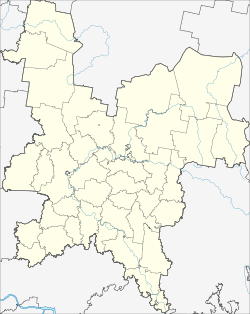Kirov, Kirov Oblast
| Kirov (English) Киров (Russian) |
|
|---|---|
| - City - | |
 View of Kirov |
|
 Location of Kirov Oblast in Russia |
|
|
|
|
|
|
|
|
|
|
| Anthem | none |
| City Day | observed in June |
| Administrative status (as of December 2012) | |
| Country | Russia |
| Federal subject | Kirov Oblast |
| Administratively subordinated to | City of Kirov |
| Administrative center of | Kirov Oblast, City of Kirov |
| Municipal status (as of November 2013) | |
| Urban okrug | Kirov Urban Okrug |
| Administrative center of | Kirov Urban Okrug |
| Head | Valery Vladykin |
| Representative body | City Duma |
| Statistics | |
| Area (urban okrug) | 757.0 km2 (292.3 sq mi) |
| Population (2010 Census) | 473,695 inhabitants |
| - Rank in 2010 | 38th |
| Density | 626/km2 (1,620/sq mi) |
| Time zone | MSK (UTC+03:00) |
| Founded | 1374 |
| Previous names |
Khlynov (until 1780), Vyatka (until 1934) |
| Postal code(s) | 610000–610002, 610004–610011, 610013–610021, 610025–610027, 610029–610031, 610033, 610035, 610037, 610040, 610042, 610044–610048, 610050, 610051, 610890, 610899, 610960–610967, 610990, 610995, 610999 |
| Dialing code(s) | +7 8332 |
|
|
|
| on | |
| 2010 Census | 473,695 |
|---|---|
| 2002 Census | 480,411 |
| 1989 Census | 440,240 |
| 1979 Census | 389,533 |
Kirov (Russian: Киров; IPA: [ˈkʲirəf]), formerly known as Vyatka (Вя́тка) and Khlynov (Хлы́нов), is a city and the administrative center of Kirov Oblast, Russia, located on the Vyatka River. As of the 2010 Census, its population was 473,695.
Khlynov was first mentioned in 1374. It was incorporated into the Grand Duchy of Moscow in 1489 and became known throughout Russia for its clay statuettes and whistles. It was also managed by Khanate of Kazan and was known as "Hılın". The town's oldest surviving monument is the Assumption Cathedral (1689), an imposing structure surmounted by five globular domes.
In 1780, Catherine the Great renamed the town Vyatka and made it the seat of Vyatka Governorate. The town also served as a place of exile, notably for Alexander Herzen, Alexander Vitberg, and Mikhail Saltykov-Shchedrin. By the end of the 19th century, it was an important station on the Trans-Siberian railway. In December 1934, it was renamed for the Soviet leader Sergey Kirov, who had been assassinated on December 1. However, whilst the name Kirov has remained since the dissolution of the Soviet Union, numerous institutions such as the university bear the former name of Vyatka.
...
Wikipedia



